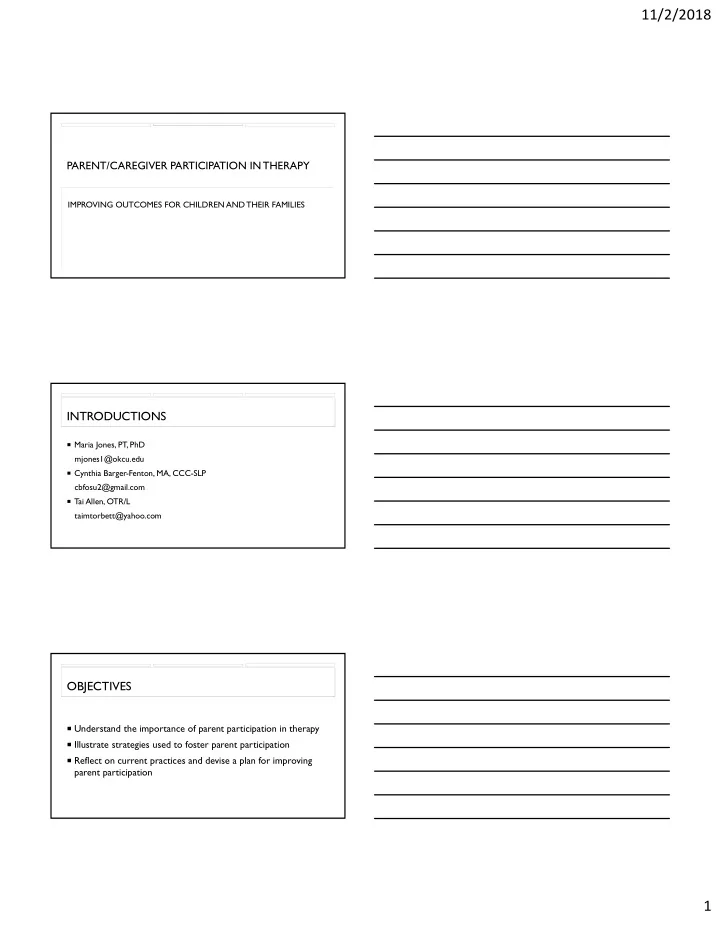

11/2/2018 PARENT/CAREGIVER PARTICIPATION IN THERAPY IMPROVING OUTCOMES FOR CHILDREN AND THEIR FAMILIES INTRODUCTIONS Maria Jones, PT, PhD mjones1@okcu.edu Cynthia Barger-Fenton, MA, CCC-SLP cbfosu2@gmail.com Tai Allen, OTR/L taimtorbett@yahoo.com OBJECTIVES Understand the importance of parent participation in therapy Illustrate strategies used to foster parent participation Reflect on current practices and devise a plan for improving parent participation 1
11/2/2018 PARENT PARTICIPATION WHAT IS IT? PARENT PARTICIPATION – WHY IMPORTANT? Honor the parent/family expertise Parents/families are central to the child’s life Parents/families have a unique set of values and relationships Parents/families are in the lead and have ownership Family life provides rich sources for child learning and development Improved outcomes when families participate in interventions Practice opportunities PARENT PARTICIPATION WHAT DO VARIOUS PROFESSIONS SAY ABOUT IT? 2
11/2/2018 PARENT PARTICIPATION Oklahoma Parent Organizations American Occupational Therapy Association American Physical Therapy Association American Speech and Language Association Oklahoma State Department of Education Oklahoma SoonerStart Early Intervention Others? PARENT PARTICIPATION – WHEN? Evaluation of Plan Effectiveness Assessment development Intervention /Measuring /Goal Setting Outcomes HOW TO BEGIN THE CONVERSATION How do you feel about daily routines? T ell me about…. Child’s participation your dreams, hopes, and goals Satisfied a typical weekday What works? a typical weekend What doesn’t? special times your family has shared together Priorities family traditions and celebrations Avoid yes/no questions 3
11/2/2018 PARENT PARTICIPATION – HOW DO YOU IMPLEMENT? Strategies Obstacles and barriers IMPLEMENTATION WHAT STRATEGIES DO YOU CURRENTLY USE? IMPLEMENTATION WHAT BARRIERS HAVE YOU ENCOUNTERED? 4
11/2/2018 PARENT PARTICIPATION WHERE DOES IT TAKE PLACE? EVALUATION THE EFFECTIVENESS Ongoing All phases process Prioritized Measures Goals to Use OUTCOMES 5
11/2/2018 MYTHS The strategies discussed don’t work with ALL families The families I work with are uninterested or disengaged You are trying to make parents be the therapist I work in a clinic/school/etc, so this won’t work in my setting I have to use standardized testing as an outcome measure QUESTIONS 6
References Adams, R.C., Tapia, C., & Council on Children with Disabilities. (2013). Early intervention, IDEA Part C services, and the medical home: Collaboration for best practices and best outcomes. Pediatrics , 132(4), 1073-1088. doi:10.1542/peds.2013-2305 American Occupational Therapy Association. (2014). Occupational therapy practice framework: Doman & process. Amercian Journal of Occupational Therapy, 69 (Supplement 1), S1-S51. Bruder, M.B., & Dunst, C.J. (1999). Expanding learning opportunities for infants and toddlers in natural environments: A chance to reconceptualize early intervention. Zero to Three , December 1999/January 2000, 34-36. Campbell, P.H., & Halbert, J. (2002). Between research and practice: Provider perspectives on early intervention. Topics in Early Childhood Special Education, 22 (4), 213-226. Childress, D., Hill, C., Jackson, S., Miller, T., & Plitt, M. E. (2015). Virginia’s coaching facilitation guide . Retrieved from Virginia Common Wealth University, Virginia Early Intervention Professional Development Center website: http://www.veipd.org/main/pdf/coaching_fac_guide_5.26.16.pdf Cooper-Duffy, K., & Eaker, K. (2017). Effective team practices: Interprofessional contributions to communication issues with a parent’s perspective. American Journal of Speech- Language Pathology, Volume 26 , 181-192. Cosbey, J. & Muldoon, D. (2017) EAT-UP ™ family-centered feeding intervention to promote food acceptance and decrease challenging behaviors in children with Autism Spectrum Disorder: A single case experimental design replicated across three families of children with Autism Spectrum Disorder. Journal of Autism and Developmental Disorders, 47 (3), 564-578. https://doi.org/10.1007/s10803-016-2977-0. Cosbey, J., & Muldoon, D. (2018) EAT-UP ™ family-centered feeding intervention to promote food acceptance and decrease challenging behaviors in children with Autism Spectrum Disorder: Report of follow-up data on a train-the-trainer model using EAT-UP™. American Journal of Speech-Language Pathology , 27 (1). 278-287. https://doi.org/10.1044/2017_AJSLP-17- 0105. Crais, E.R. (1991). Moving from “parent involvement” to family-centered services. American Journal of Speech-Language Pathology, 1, 5-8. Fava, L., Strauss, K., Valeri, G., D’Elia, L., Arima, S., & Vicari, S. (2011). The effectiveness of a cross- setting complementary staff-and parent-mediated early intensive behavioral intervention for young children with ASD. Research in Autism Spectrum Disorders , 5 (4), 1479-1492. Darrah, J., Law, M., & Pollock, N. (2001). Family-centered functional therapy: A choice for children with motor dysfunction. Infants and Young Children, 13 (4), 79-87. Dunn, W., Cox, J., Foster, L. Mische-Lawson, L., & Tanquary, J. (2012). Impact of a contextual intervention on child participation and parent competence among children with autism spectrum disorders: A pretest-posttest repeated measures design. Amercian Journal of Occupational Therapy, 66 (5), 520-528. Dunst, C.J. & Raab, M. (2004). Parents' and practitioners' perspectives of young children's everyday natural learning environments. Psychological Reports, 93 , 251-256. Dunst, C. J. & Trivette, C. M. (2012). Moderators of the effectiveness of adult learning method practices. Journal of Social Sciences, 8 (2), 143-148. Early Intervention Program for Infants and Toddlers With Disabilities; Assistance to States for the Education of Children With Disabilities; Final Rule and Proposed Rule, Volume 76, Number 188, 34 C.F.R. § 303.118 (2011). Foster, L., Dunn, W., & Lawson, L.M. (2013). Coaching mothers of children with autism: A qualitative study for occupational therapy practice. Physical & Occupational Therapy in Pediatrics, 33 (2), 253-263. doi:10.3109/01942638.2012.747581 Friedman, M., Woods, J., & Salisbury, C. (2012). Caregiver coaching strategies for early intervention providers: Moving towards operational definitions. Infants and Young Children , 25(1), 62-82. doi:10.1097/IYC.0b013e31823d8f12
Recommend
More recommend